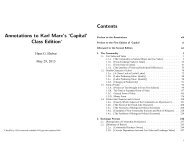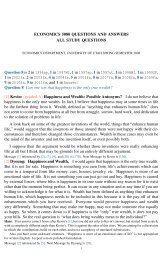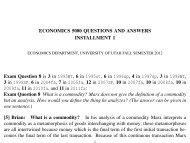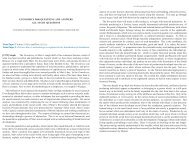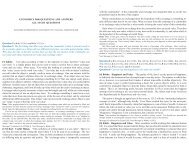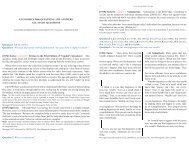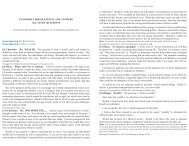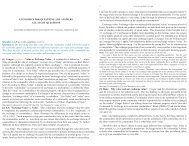Question 1 What did Marx mean with his formu - University of Utah
Question 1 What did Marx mean with his formu - University of Utah
Question 1 What did Marx mean with his formu - University of Utah
Create successful ePaper yourself
Turn your PDF publications into a flip-book with our unique Google optimized e-Paper software.
U <strong>of</strong> <strong>Utah</strong> Econ 5080 2007fa 63<br />
[76] Ashley: Commodities Are Like Paintings. A commodity is an article <strong>of</strong> trade or<br />
commerce. The value is the substance <strong>of</strong> that commodity. In economics, we discuss how<br />
important commodities are in society, but in order to truly understand what a commodity is,<br />
we need to understand the <strong>mean</strong>ing <strong>of</strong> it, the value, which is what is most important. The<br />
value is the different labors and uses that make up the commodity which, at most times,<br />
is overlooked. Most people look at the total package, not at what its contents are. I like<br />
to compare t<strong>his</strong> subject to a painting. Everybody “aaaahhhh’s” at the picture when it is<br />
complete, but they don’t know the work that goes in to each stroke by the artist, however,<br />
<strong>with</strong>out the strokes, there would be no painting. The same goes for a commodity. The<br />
commodity is the painting as a whole, and the value is like the strokes. It is impossible<br />
for one to exist <strong>with</strong>out the other, and at the same time, the strokes (value) are what’s most<br />
important.<br />
Commodities are the MAIN subject <strong>of</strong> t<strong>his</strong> chapter, we are just going into detail about its<br />
components, and that’s why it’s the title <strong>of</strong> the first chapter.<br />
Message [76] referenced by [81]. Next Message by Ashley is [265].<br />
[80] ZACH: Problem <strong>with</strong> the word ‘Value’. There is a problem <strong>with</strong> the word value. I<br />
believe that the reason the first chapter is called commodities and not value is because some<br />
people don’t value things the same as others. For example, an oil company doesn’t “value”<br />
a piece <strong>of</strong> plywood as much as a lumber company does. Plywood is definitely a commodity,<br />
but it has no value to the oil company. T<strong>his</strong> piece <strong>of</strong> wood makes the lumber company a lot<br />
<strong>of</strong> money when sold in large quantities, yet that plywood’s value is zero for the oil company.<br />
That is why the first chapter was called commodities, because each company can relate to<br />
commodities and what their “value” is to that specific company. Not every commodity is<br />
valued the same.<br />
Message [80] referenced by [81] and [401]. Next Message by ZACH is [270].<br />
[81] Hans: Cancerous Value. Value, in <strong>Marx</strong>’s theory, is not a subjective attitude which<br />
varies from person to person as ZACH says in [80]. It is also not primarily the <strong>mean</strong>ing<br />
<strong>of</strong> the commodity, as Ashley says in [76], although there is some truth in it: value is some<br />
immaterial substance inside the commodities. Value is at the same time something inside<br />
the commodities and a social relation.<br />
The problem <strong>with</strong> value is that in capitalism, value is not static but it is moving. It<br />
jumps from commodity to commodity and becomes bigger and bigger. Its self-aggrandizing<br />
movement, which can be compared <strong>with</strong> a cancer, is the main driver <strong>of</strong> the economy. <strong>Marx</strong><br />
hasn’t said t<strong>his</strong> yet in the assigned readings, he will say t<strong>his</strong> in Chapter Four. <strong>What</strong> drives the<br />
capitalist economy is therefore not the greed <strong>of</strong> the capitalists but the inner necessity <strong>of</strong> the<br />
social relation “value” to accumulate, to become bigger and bigger and to be concentrated<br />
in fewer and fewer hands.<br />
<strong>Marx</strong> holds that social relations, generally, cannot be explained by individual motivations<br />
but they have their own dynamic. The topic <strong>of</strong> the whole book Capital is the anatomy <strong>of</strong> the<br />
social relation “value,” the explanation how it can and why it must accumulate relentlessly.<br />
Since social relations cannot be derived from individuals, it would be wrong to begin such<br />
an anatomy-book <strong>with</strong> individuals. Instead, <strong>Marx</strong> begins <strong>with</strong> the commodity, because the<br />
64 2007fa Econ 5080 U <strong>of</strong> <strong>Utah</strong><br />
commodity is a simple and concrete object which gives us the entry point into the social<br />
relation “value.”<br />
Message [81] referenced by [83], [178], [188], [220], [2012fa:132], and [2012fa:456]. Next Message by Hans is<br />
[90].<br />
[83] Chris: value as the components <strong>of</strong> the whole “Commodity”. <strong>Marx</strong> entitled <strong>his</strong> first<br />
chapter “Commodities” because commodities are at the heart <strong>of</strong> everything he discusses on<br />
capitalism. The in-depth discussion on values helps us to understand what makes a commodity,<br />
what makes an object more than something that merely satisfies needs or wants but<br />
makes it worth something in an exchange market, what gives it exchange-value. Before reading<br />
the first chapter I would have wrongly asserted that anything that has use or a use-value<br />
should accordingly be held to be a commodity but <strong>Marx</strong> discusses in length the exchange<br />
values and a commodity <strong>mean</strong>t something different to me after that. If <strong>Marx</strong> had stepped<br />
right into commodities and overlooked what values <strong>mean</strong>t to them he would have left a large<br />
gap in an already deep subject.<br />
Hans: Chris, in the long message [81] I wanted to say that the true subject <strong>of</strong> <strong>Marx</strong>’s work is indeed value, and the<br />
first chapter is called ”commodity” because the commodity is a good starting point for studying value.<br />
Chris: So I think I turned t<strong>his</strong> around then. He starts <strong>with</strong> commodities because it is an easy way to begin an<br />
earnest discussion <strong>of</strong> value which drives capitalists.<br />
Hans: Exactly.<br />
Next Message by Chris is [115].<br />
[173] Poppy: The first Chapter <strong>of</strong> Capital is called “Commodities” despite the heavy focus<br />
and discussions on value. T<strong>his</strong> is because <strong>Marx</strong> wants to introduce <strong>his</strong> strong theory/view <strong>of</strong><br />
what the relationship between both Commodities and Value truly is. His viewpoint is new<br />
and somewhat liberating to what other economists and possibly most people first assume<br />
when comparing the two. Previously and currently the relationship is thought to be linked to<br />
its exchange-worth, however t<strong>his</strong> is contradictory to what <strong>Marx</strong> tell us. A commodity’s value<br />
heavily depends on what service or need it provides, not necessarily on what its exchange<br />
proportion is. Thus, making the importance <strong>of</strong> a commodity is its relationship to its value.<br />
They go hand in hand.<br />
Because it is too easy, and can be quickly comprehended, that the relationship between<br />
commodities and value is determined by its exchange-proportion to other commodities, it<br />
was important that <strong>Marx</strong> introduced t<strong>his</strong> book <strong>with</strong> A: commodities, and by B: strongly<br />
associating them to their values, and explaining exactly what their value really <strong>mean</strong>t.<br />
Hans: You are right that <strong>Marx</strong> distinguishes between value and exchange-value, but value in <strong>his</strong> theory is not<br />
determined by importance but by labor content.<br />
Next Message by Poppy is [437].<br />
[178] BHales: Commodities vs. Value. <strong>Marx</strong> labels the first chapter “Commodities”<br />
because it gives him a good entry to explaining the social relation tied to value. Once a<br />
person can understand the concept <strong>of</strong> a commodity, it becomes easier for him to understand<br />
value and its social relation. As Hans said in [81] “value is some immaterial substance inside<br />
the commodities. Value is at the same time something inside the commodities and a social<br />
relation.”<br />
Hans: You seem to say that “commodity” is a more fundamental concept than “value,” just as integers are more<br />
fundamental than rational numbers and therefore must be studied first. But t<strong>his</strong> is not the case. “Value” is the more<br />
fundamental concept.<br />
Next Message by BHales is [311].



